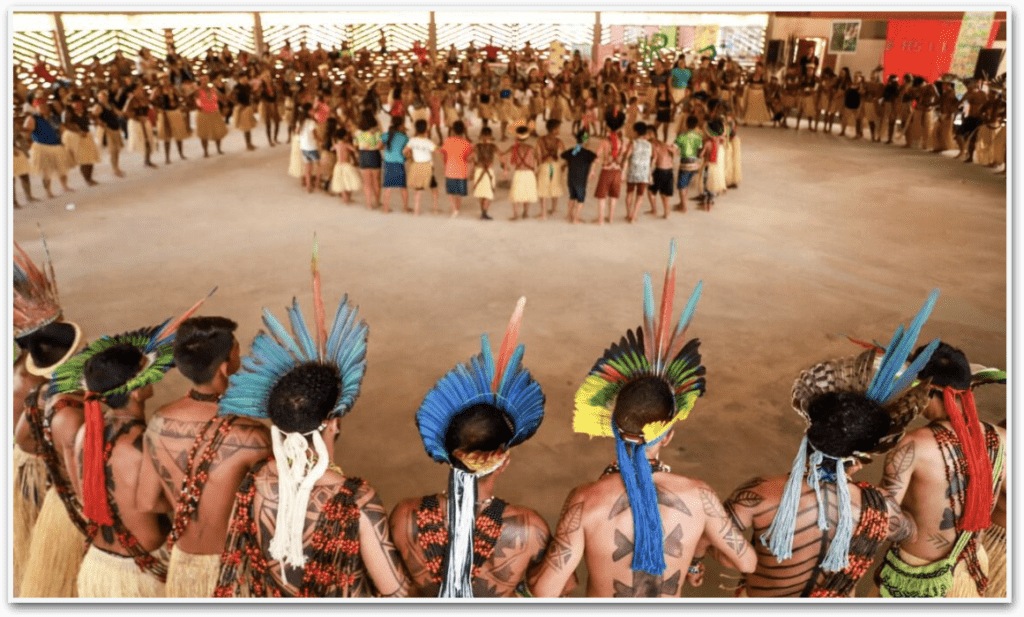The Puyanawa People
The Puyanawa People
The Puyanawa people, like most of Brazil’s indigenous peoples, have had to resist and fight hard on behalf of their culture and customs.
In addition to being victims of the rubber boom, when they were expelled from their lands and forced to work in the rubber plantations, they suffered from the superimposition of non-indigenous culture, being catechized and educated in schools that prohibited the expression of any trace of their culture.
Only after regaining their land, which was only ratified in 2001, did the Puyanawa decide in a more incisive way to reintegrate their culture, language, and customs – massacred in the process of evangelizing the tribe.
There are about 647 Indigenous living in the Puyanawa Indigenous Land, in a territory of approximately 24,000 hectares.
They are excellent farmers, and their main source of income is from cassava cultivation (which is the theme of the festival that takes place on their land – the ATSÁ Festival).
The Puyanawa speak a language of the Pano language family. The language is called Ûdikuî by the speakers, which means “true language.”

The strength, perseverance, and organization of the Puyanawa people were crucial in keeping their people and traditions from becoming extinct.
Education
Originating from the Pano linguistic trunk, the Puyanawa face a series of problems caused by the superimposition of non-indigenous culture on indigenous culture.
The rescue of their language is one of their priorities, at the same time as they seek insertion in public schools.
In the Puyanawa Indigenous Land of the Barão, 29 Indians have higher education and 178 have completed high school.
The greatest caution to be taken is that it is easy to lose one’s traditions when moving between different cultures, so another point of perseverance for this people is to integrate non-indigenous education without losing their traditions and ancestry.
Sustainable Production
The combination of technology and traditional knowledge has turned the Puyanawa into major producers of cassava flour in the Vale do Juruá region.
In parallel, the Puyanawa are investing in reforestation of open areas.
The Puyanawa stand out as one of the most productive peoples and at the same time as the least deforesting, producing without destroying nature.
They achieve harmony between giving to and receiving from Mother Earth. They are true Guardians of Nature!

Culture and Identity
“Culture is the sustainability of our right, of our life. It is what identifies us. It is our traditional and spiritual knowledge, which gives us the knowledge and value of our essence. Without culture a people does not exist.”
– Chief Joel Puyanawa –
It can be said that the Puyanawa people today are a people who seek harmony between “modern” and traditional ways, and are able to unite this knowledge with mastery and, best of all, with love for their ancestry.
They are a people who have opened themselves up to the new, expanded their knowledge and conquests, and have overcome the greatest challenge of keeping their traditions and customs alive, even when these were suppressed by the colonizing process they suffered in the past.
The resistance and resilience in keeping their culture alive is one of the Puyanawas’ biggest flagships.
In 2017, they promoted the First ATSÁ Festival – the name of cassava in the Puyanawa language – which celebrated their culture through music, dance, body painting, and native rituals.

The Festival is open and brings together guests from other peoples and non-indigenous and is usually celebrated in the month of July.
Besides the dances, handicrafts and cultural rites, visitors can also try the traditional caiçuma (fermented drink made from cassava), cassava-based foods and other typical delicacies. The program also includes forest walks, spiritual ceremonies based on the medicine of the forest and the inherited wisdom of its ancient shamans, and other incredible experiences.

The Puyanawa are used to difficulties. They spent a period as almost slaves to farmers and faced a flu epidemic at the beginning of the 20th century that almost decimated the entire ethnic group. But they survived all these threats and today are proud to have resumed contact with their ancestors. The young people sing and speak the original language, and almost all the people dress like their ancestors on festival and shamanic days.

It is enchanting to see that despite so many adversities, so many struggles, these people have managed to prosper and open themselves up to the new, keeping their traditions alive, the beauty of their culture and of being who they are.
Long live the Puyanawa people!

